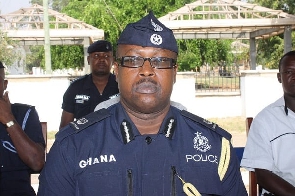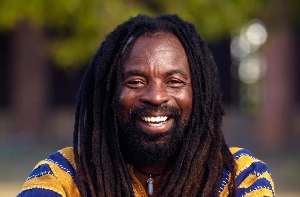Kwame Ohene Asare
Does the recent verdict in the Woyome case represent a deliberate failure to prosecute or a sheer failure of effective adjudication? It is either both or a grand conspiracy between the two, and that the seeming pantomime has yet to reach its climax.
Twenty-three years ago, in very harrowing circumstances, Ghana’s Attorney General, Mr GEK Aikens, recited in a rather intransigent mood the words of a former British Attorney General:
‘The initiation of the litigation and the determination of the question as to whether or not, this is a proper case for the Attorney General to be involved in, is a matter beyond the Jurisdiction of this or any other court.’
These were the borrowed words, if not the distressing cry of the PNDC’s Attorney General in June 1982, when he refused to be drawn on any dispute as to whether to prosecute Captain Kojo Tsikata. Kojo was recommended for prosecution by the SIB, which investigated the brutal murder of the three High Court Judges in 1982. However, Mr Aiken, obviously the Chief Government Lawyer at the beck and call of the PNDC’s Military Junta, declined to prosecute Kojo although he had been found in the report as suspected of being responsible for masterminding the heinous conspiracy to murder four important Ghanaian personalities, including the three High Court Judges. Today the effigies of these Judges can be found in the forecourt of the Supreme Court of the Country, as one perversion of Justice follows a travesty of sorts in the main and surrounding buildings. They were clearly murdered for their strict adherence to the rule of Law. In the face of the apparent perversion of justice as perceived by many in the Woyome matter, one is bound to ask whether our Judges died in vain?
The booming voice of Rawlings across the social media today expressing disappointment over the apparent exoneration of Agbesi Woyome is therefore rather revealing as to the likelihood of Executive influence then as it is now in the Woyome matter. ‘Do you think we are fools?’ Rawlings boomed. This was quite an ironic twist, if not a blast from the past. In my view, Rawlings did not allow any of the fancy/window dressing experienced today because it was believed the Judiciary was strong enough at that time to convict Kojo Tsikata, undoubtedly, in spite of the guns, which would have been literally trained on them whilst they adjudicated the matter. Rawlings’ voice and sense of injustice was rather conspicuous by its deafening silence at the time.
How can our Legal system today, twenty-three years latter, fail so woefully to deliver justice in so many prominent cases with significant public interest even in the light of indubitable evidence of wrongdoing?
In England, the courts are still reluctant to interfere in the decisions of the Attorney General but if a serious public interest case can be justified, I cannot anticipate the possibility that the Courts, whether in England or in Ghana, properly ‘seised’ in the matter would turn down a mandatory injunction compelling prosecution in a matter.
With significant developments in administrative Law, no Attorney General is able now to brazenly repeat the borrowed words of Mr GEK Aikens. There are now many reported cases on the decision not to prosecute. In a decided case 2 years ago a UK High Court took the “highly exceptional” step of ordering the Crown Prosecution Service to review its decision not to prosecute in a case involving an allegation of rape.
Although, the Attorney General’s Department of the Republic of Ghana has enjoyed unfettered discretion as to whether or not to prosecute, with the coming into force of article 296 of the 1992 constitution, that discretion has become subject to legal regulation. A decision not to prosecute, therefore, cannot be exercised arbitrarily or capriciously. Hence barring any questions of delay, often fatal to administrative law remedies, a vigilante of sorts is therefore able to seek Judicial Review of the Attorney General’s decision whether to initiate litigation or otherwise.
It was unimaginable that given the obvious conspiracy that was suspected to have been at play, Woyome would ever have been sent to jail. However we did not anticipate that such an outcome would have been secured through the obvious watering down of evidence by the prosecution and a seemingly blatant obfuscation of simple evidence and rules of Law that the presiding Judge, Justice Ajet Nasam engaged in.
The evidence led by the prosecution obviously suggests that Betty Mould, Paul Asimenu, Barton Oduro, Niiquaye Tetteh, just to mention but a few, were vital witnesses, whose absence at trial were obviously harmful to the success of the case. However, in my view, the case could nevertheless have been successful without the said witnesses; these three persons were either complicit or willing partakers in one of the 2 offences Woyome was charged with or were palpably, gullibly defrauded.
You and I were not there, certainly not in court, and of course unlike Justice Ajet Nasam we have not had opportunity to read any of the testimonies in the case, no opportunity to see the witnesses give evidence in the case, we did not see their demeanour and disposition. The outcome of this case nevertheless represents a bizarre conspiracy to cause grievous assault on the pursuit of justice and indeed of the fight against the sheer rampant prevalence of corruption in Ghana.
I found Justice Ajet Nassam’s reasoning, in discharging Woyome from the offences, to be somewhat puzzling. At the very inception of his decision he impliedly warns that public interest was irrelevant to him and he curiously relies on a precedent set by Justice Atugugba, whose notoriety in Ghanaian Jurisprudence was spotted by all in a suspect ruling on Ghana’s first ever Presidential petition. Pardon me for over-politicising the point. Of course, it is the evidence adduced in Court that must determine the guilt of the accused and undoubtedly public interest must not be allowed to determine the guilt or otherwise of the accused, however, unless the Judge had no interest in helping Ghana out of the near-depraved state in which the Country is, then Ajet Nasam should have been prompted by Public Interest to consider the evidence available as thoroughly as possible and indeed with a fine-toothcomb. Public Interest alone should have informed how vigorous he should have been at the case management stage of proceedings and it is not unlikely that such a proactive involvement could have produced the witnesses, whose absence, he so consistently decried in his Judgment. The Judgment was rather poor for ignoring volumes of testimonies in the matter which, to all intents and purposes would have gone to show that the Defendant had no Contract with the State and that the Defendant ought to have known that he had no entitlement to the money claimed, nor could he not have believed otherwise.
The Judge more or less questions why the charges were brought, in that there was no basis for doing so, when indeed the case is supposed to have transcended an application for No Case to answer. Further, Ajet Nassam effectively finds, presumably on the basis of the evidence before him, that no false pretence was practised by Mr Woyome and indeed that no such pretence could have caused the payment to be made. That is mind-numbingly shocking against the background of the previous civil court decisions which he was entitled to draw inferences from. This clearly suggests that either the prosecution produced no useful evidence at all or that the Judge had extreme difficulty understanding the evidence that was before him.
From Ajet Nassam’s reasoning, it would appear he simply found Mrs Betty Mould Iddrissu did all she was reasonably expected to do and she reasonably believed that the money was owed to Agbesi Woyome, as a result of which she failed to defend proceedings and ultimately settled to the detriment of our nation. The gullibility or complicity of the Attorney General and Finance departments would appear to have been used as a basis for concluding that the State was not defrauded. How Bizarre? Why was Osafo Marfo’s evidence completely ignored? Linked with the Supreme Court (civil) Judgment in the case, it should have been beyond every shadow of a doubt that the State was either duped by Woyome, acting alone, by practising deception on extremely gullible State Officials OR Officials operating as willing participants in a gargantuan conspiracy.
It is instructive to note though that the Judge placed considerable weight on the fact that Betty Mould received written advice from Paul Asimenu as to the validity of the Claim; the man, whose wife was found to have received some $400,000 from Woyome, and the man whose prosecution was abandoned by the Attorney General’s department. Of course, the evidence of payment may not have been before the Court. It just suggests that Ajet Nasam either deliberately refused to reason as to what possible explanations there may have been for so many top Ghanaian officials being so mistaken. He didn’t. Rather, he found that they rightly believed that Woyome had a contract. Indeed if the case was that bad then as much as I hate to agree with our State Attorneys, then the case should never have gone the whole hog.
All the prosecution had to prove beyond reasonable doubt was that Woyome made false representations through his court claim or to the A.G. – to wit – that he had a contract with Government to obtain finance for the stadia project, which he knew to be untrue and which he performed but was not paid for, namely, that he was entitled to 2% of the total financial package ultimately obtained for Government for which 51.2 million cedis was ultimately paid to him.
I am worried about the poverty of reasoning in the learned Judge’s decision, but I can understand that the prosecution may have made matters very difficult for him. However, he needn’t have overegged the pudding, leaving a dark cloud of doubt hanging over his sincerity in refereeing this litigation.
Opinions of Sunday, 22 March 2015
Columnist: Asare, Kwame Ohene


















